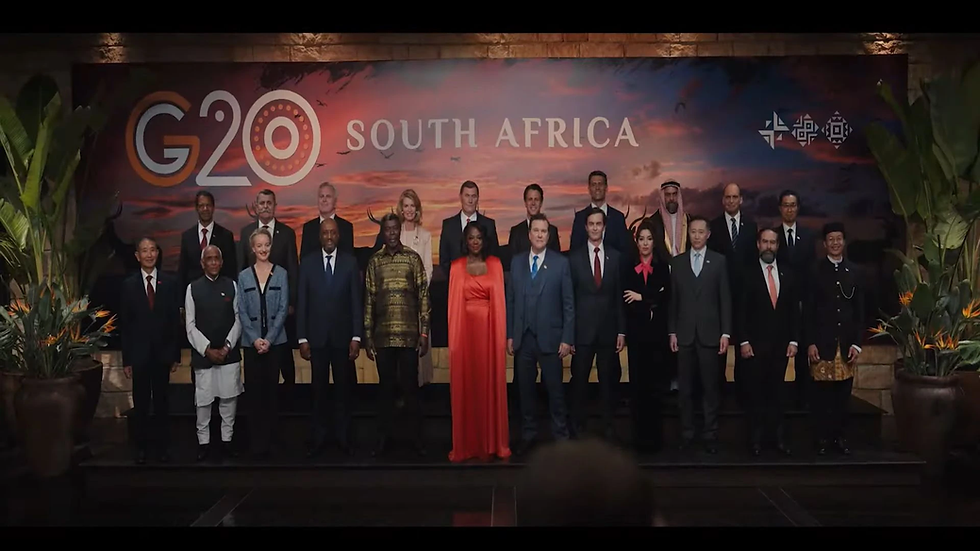South Africa’s Rise as a Prime Filming Destination for International Film Productions
- BY SHER OMAR

- Sep 1, 2025
- 3 min read
Updated: Sep 1, 2025

Is it the low filming costs? Or the jaw-dropping views? Honestly, it’s probably both. South Africa has quickly gone from being a hidden gem to a prime hotspot for international filmmakers. Think: Cape Town doubling as New York, golden beaches turning into California, and our paid actor, Table Mountain,can set a fantasy saga. Add with skilled local crews, state-of-the-art studios, and sunshine almost all year round, you’ve got the perfect recipe for movie making magic.
South Africa is in its RISING STAR era! The country, and Africa in general, is rapidly emerging as a top destination for international filmmakers, thanks to its diverse landscapes, skilled workforce, and economic incentives. South Africans understand the appeal of our beautiful country, but that appeal has reached beyond our borders. It has become a global appeal to shoot films and tv shows around Africa/South Africa due to its landscapes, infrastructure, economic benefits, and cultural richness.

City of Cape Town by Taahir Sarguro
“South Africa is definitely open for business,” according to Tshepiso Chikapa Phiri, CEO and founder of the Known Associates Group of companies, one of which is Moonlighting Films PTY (LTD). She states that “Our Rand still goes a long way. We’ve got great facilities, we’ve got great crews that are highly skilled. We are still a country to be looked at. One thing about South Africa is we are resilient. We know how to ride a wave — and we hope our partners and clients internationally will stay with us” and she nailed it on the head. South Africans are extremely resilient, and despite there being a massive decline of filming in 2021 due to COVID-19, our local filmmakers certainly haven’t stopped content creating, and have upped our game for service providing when it comes to international filmmaking, and here are some reasons why…
South Africa’s breathtaking landscapes and variety of locations make it a versatile choice for filmmakers. Coastal beaches, deserts, mountains, savannahs, and urban centers offer a wide range of settings. Close proximity of different terrains reduces travel time and production costs. Look at our beautiful Mothercity of Cape Town: although there is nowhere in the world that comes close to Camps Bay or Llandudno Beach, it quite easily poses as a stand-in for both European cities and African settings in films.
Government incentives and affordable production costs attract international film projects to South Africa. They have easy access to tax rebates and grants for foreign productions, provided with profoundly skilled local crew at competitive rates, and have lower operational costs compared to filming in the US or Europe.
Hoedspruit Travel Information
What international filmmakers are really drawn to is South Africa’s rich cultural diversity that can’t be found anywhere in the world. It provides filmmakers with authentic settings and unique narratives, the ability to portray multiple cultural and historical contexts within one country and an opportunity for films to use South African locations to depict other African countries or fictional worlds; for example, Wakanda in Black Panther (filmed in Uganda) and the post-apocalyptic desert wasteland in Mad Max: Fury Road (filmed in Namibia.)
Recently, we’ve had some major stars film in our very own Limpopo, such as Tom Cruise for the new Mission Impossible: The Final Reckoning, Viola Davis for G20, Chris Pratt for The Terminal List, and Cape Town’s famous Chapmans Peak drive has been featured in multiple Hollywood and Bollywood films, as well as Camps Bay being featured in The Kissing Booth trilogy.
Viola Davis' 'G20' Movie | Tom Cruise in South Africa | Rhino Africa Blog
South Africa's film industry has announced its raw talent, mesmerising locations, and unique storytelling to the world. And in return, the world has fallen in love with not only South Africa’s natural landscapes, but for the character, diversity and beauty of its people as a nation. Even with higher costs, production companies are likely to allocate budget to film here, recognizing the location as a valuable backdrop for bringing their creative visions to life. It certainly adds depth to their worlds of story and the emotional journey unfolding within their stories.
With the South African government constantly supporting the arts, our thriving and fast-growing production companies, and a commitment to authentic storytelling, South Africa's cinematic future looks like it will give American & European film industries a real run for their money!





































































